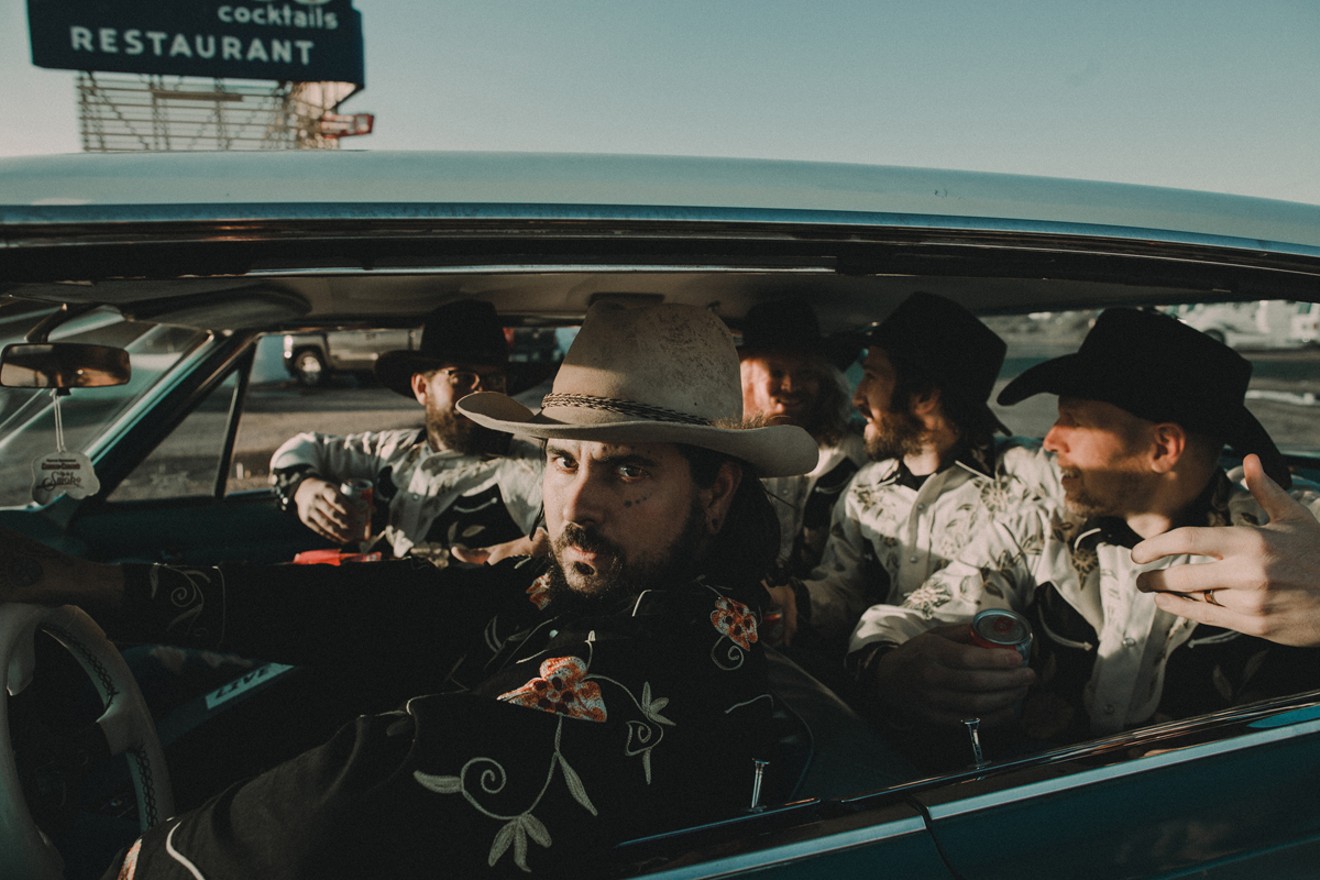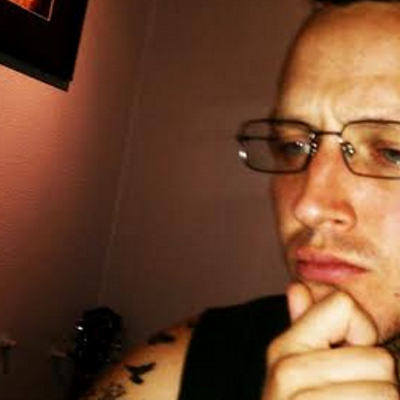“My mom told me where my dad was buried, so I brought a gun and started shooting the hell out of his grave,” recalls Hang Rounders vocalist and banjoist Johno Roberts. “I was crying while I was doing it, because I never got to express my feelings toward him. After, I felt such a weight off of my shoulders. I wouldn’t recommend anyone doing that, though. I’m sure it’s highly illegal.”
The incident Roberts is speaking of is the subject of the song “McCrory Lane,” the closing track on his Denver country band’s newest album, Outta Beer, Outta Here. The song tackles his struggles growing up without a father, but still manages to remain somewhat lighthearted and danceable.
“Writing songs specifically so people can dance but that are still emotionally discharging is tough,” Roberts acknowledges.
Hang Rounders — fleshed out by Tyler Breuer on pedal-steel guitar, Curtis Wallach on electric guitar, Matthew Lilley on bass and Dan Feely on drums and percussion — take on the challenge of being an emotionally cathartic party band with aplomb. At the helm of this two-stepping country throwback is Roberts, 32, who uses the project to expunge demons and tell stories from his tough upbringing — and having a good time doing so.
Roberts grew up in Nashville, where he was steeped in the city’s rich musical tradition in ways he didn’t even realize at the time.
“My mom used to do backup singing for a lot of Nashville studio stuff,” he says. “She also worked at a honky-tonk and used to take me to work with her. I grew up in honky-tonks, two-stepping since I was five years old. You couldn’t really get away with that now.”
Because of his single mother’s time constraints, Roberts may have been exposed to the country lifestyle out of necessity; nonetheless, the influence was undeniable. As he got older, he started playing music of his own, taking regular guitar lessons from country-music legend Sammy Kershaw, who lived in the apartment above them. He also rubbed elbows with such Nashville legends as Sawyer Brown, Jimmy Dickens and George Jones. “Reba McEntire used to babysit me,” he recalls with a laugh.
While music was important to Roberts, with a mother working two jobs and no father, he soon became aimless, making bad decisions.
“I didn’t know what I was doing — I was never grounded,” he says. “Having a mom that’s working in a dry cleaner during the day and a bar at night, she was never around. My dad went to jail when I was two years old; he got out when I was sixteen, then died two weeks later. I never knew him.”
It was around this time, as a teenager, that Roberts developed a $500-a-week heroin habit. Strung out and hopeless, he stopped playing music altogether. It took a tragic event to get him off drugs.
“One night, we were all joking around with a gun. It went off and shot my friend in the head,” he says. “We were all too fucked up to call 911, and we thought we were gonna go to jail. It sucked to watch my friend die in front of me, but I’m thankful that it pulled me out of that life. I was strung out and didn’t care about anything else. When that happened, I quit cold turkey.”
Roberts and his friends did eventually call the police, and one of them — the one who pulled the trigger — spent ten years in jail for his part in the tragedy. Not wanting to return to his old habits and haunts, Roberts decided then and there to leave Nashville, but he had no clear plans.
“I grew up without a real sense of what to do or where to go,” he says, “but what my mom taught me was to just work hard, so I always just followed the work. I’d bale hay in Oklahoma, or I’d work at a cranberry farm in Wisconsin — I’d just go wherever the work took me. I was in Florida for three summers in a row repairing homes from hurricanes. Sure, it makes you feel good, but I was getting paid.”
While in Oklahoma, Roberts reconnected with a childhood friend, Daniel Pujol. Pujol, still well known in Nashville for his eponymous garage-rock band, Pujol, reached out to Roberts and encouraged him to find music again.
“He wrote me a song and told me to send one back to him,” Roberts says. “We probably wrote twenty songs like that. It ended up being a very creative time in my life. I was just sitting on a tractor all day and would think of songs in my head. Then I would come home and sit in my closet and record them. I would shake jars of pennies for a drumbeat. I had terrible rhythm.”
After that collaboration with Pujol, Roberts returned to Nashville, recharged his creativity and started writing songs that the Hang Rounders still play today. His nomadic lifestyle eventually led him to Denver, and while he only stayed six months his first time, he liked it so much that in 2009 he returned for good.
Searching for a community and musical counterparts, Roberts, who was into cycling, found his way to Wallach, who owned a bike shop at the time. Wallach was also an accomplished longtime Denver musician, playing in folk bands like Pillage My Village and the Legendary River Drifters. He also had a love for country music, and the two started Hang Rounders in 2015.
“At the time, there wasn’t a band in Denver that you could two-step to,” Roberts says. “Besides square dancing, there wasn’t any outlet. My main focus was for the band to be danceable.”
Hang Rounders soon released its first album, Bring Your Sister, which read like a biographical account of Roberts’s life, typified by tracks like “Growing up in the South,” where he discusses, among other things, the night his friend died and how much his mother did for him.
“Growing up, I had a lot of angst about [my mom] not being in my life,” he says. “Now that I have a child of my own, I realize how much she did for me. There was never a time when we wouldn’t have Christmas. We’d be broke as hell, but there was always something under the tree. She worked her ass off for me to do that.”
Making confessional music that people could move to — in the studio as well as on the stage — helped the band carve out a niche in Denver. Enthusiastic crowds began showing up to drink and dance with abandon, just as Roberts had hoped they would.
The group continues this style on Outta Beer, Outta Here, which, like the first album, was recorded in Nashville. Roberts used his connections to secure a spot at Bomb Shelter Studios, a legendary analog studio with a client list that includes such notables as Alabama Shakes, the Deslondes, Benjamin Booker, Hurray for the Riff Raff and Langhorne Slim. The album was mixed by Andrija Tokic and Ed DuQuesne and mastered by John Baldwin, who has worked with Merle Haggard, Kris Kristofferson, Emmylou Harris and Sly Stone. It was a benchmark for a Southern kid who almost gave up music for good.
Recording Outta Beer in his home town was important to Roberts. “[Nashville] is still where I feel at home, and it always has a huge place in my heart,” he says. “[Going] from shaking pennies in a closet in Oklahoma to recording in a famous studio in Nashville is all I could ever ask for.”
Roberts says that while the album sounds more “fun” than his previous efforts, the darkness from his past still lurks in the songs. While getting people dancing and having a good time is a mission for Hang Rounders at live shows, Roberts also has a more profound goal in his songwriting.
“I’m a pretty quiet person — I don’t like to cause a scene,” he says. “I’ve always kept to myself rather than talk about feelings, but I write music about them. I want people to not feel alone. That’s what music always did for me. I want people to not feel alone in the world.”
Hang Rounders album release, Friday, September 29, Syntax Physic Opera, 554 South Broadway, $7.
[
{
"name": "Air - MediumRectangle - Inline Content - Mobile Display Size",
"component": "12017618",
"insertPoint": "2",
"requiredCountToDisplay": "2"
},{
"name": "Editor Picks",
"component": "17242653",
"insertPoint": "4",
"requiredCountToDisplay": "1"
},{
"name": "Inline Links",
"component": "18838239",
"insertPoint": "8th",
"startingPoint": 8,
"requiredCountToDisplay": "7",
"maxInsertions": 25
},{
"name": "Air - MediumRectangle - Combo - Inline Content",
"component": "17261320",
"insertPoint": "8th",
"startingPoint": 8,
"requiredCountToDisplay": "7",
"maxInsertions": 25
},{
"name": "Inline Links",
"component": "18838239",
"insertPoint": "8th",
"startingPoint": 12,
"requiredCountToDisplay": "11",
"maxInsertions": 25
},{
"name": "Air - Leaderboard Tower - Combo - Inline Content",
"component": "17261321",
"insertPoint": "8th",
"startingPoint": 12,
"requiredCountToDisplay": "11",
"maxInsertions": 25
}
]












